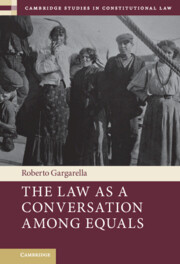Refine search
Actions for selected content:
4 results
7 - International Practice and Climate Change
- from Part II
-
- Book:
- On Global Learning
- Published online:
- 07 September 2023
- Print publication:
- 21 September 2023, pp 184-209
-
- Chapter
- Export citation

The Law As a Conversation among Equals
-
- Published online:
- 25 April 2022
- Print publication:
- 21 April 2022
20 - Conclusion
-
- Book:
- The Law As a Conversation among Equals
- Published online:
- 25 April 2022
- Print publication:
- 21 April 2022, pp 308-326
-
- Chapter
- Export citation
19 - The New Deliberative Assemblies
-
- Book:
- The Law As a Conversation among Equals
- Published online:
- 25 April 2022
- Print publication:
- 21 April 2022, pp 290-307
-
- Chapter
- Export citation
